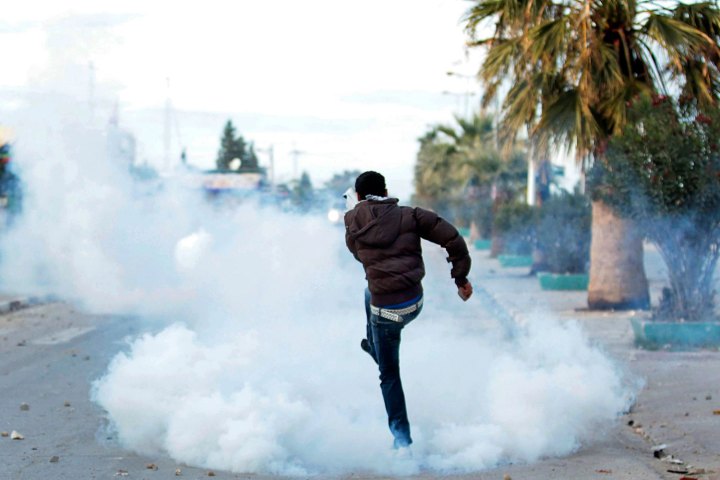Nearly two years have passed since the world was transfixed by the protests sweeping through Tunisia, which brought down the 23-year dictatorship of Zine el-Abidine Ben Ali and ignited the Arab Spring. In recent days, with the second anniversary of the Jasmine Revolution just weeks away, there have been similar rumblings once again, as hundreds of young Tunisians have fought pitched battles with police over the exact issue that drove them into the streets in Dec. 2010: jobs.
For three days last week, youth mobbed the streets of Siliana, a town of just 25,000 people southwest of the capital Tunis—similar in fact, to the town of Sidibouzid, where the Jasmine Revolution began with the self-immolation of a young, unemployed street vendor, Mohamed Bouazizi. About 300 people were injured in last week’s rioting, as police fired tear gas and birdshot at crowds of youth, who pelted them with rocks, and similar demonstrations erupted in Tunis. “There is no hope for the future among our generation,” Sam Guirat, one of the protesters in Siliana, told Al Jazeera on Friday. “I am 28 years old and I have been jobless for five years.
Fearing the chaos could spread, the government deployed the military to Siliana to restore order. Despite a tense calm now settling over the town, the peace could be temporary. On Saturday, President Moncef Marzouki, a secular liberal, called for the Islamist cabinet to resign, warning, “If the clashes continue and the government’s response is not adequate, there will be chaos and a dead-end.”
But Tunisian youth have reason to feel they’ve already reached an economic dead end. Although young people like Guirat now have democratic rights, they face job prospects every bit as bad as they were before the revolution. The country’s unemployment rate has in fact increased since then by about 7%, according to estimates by the International Monetary Fund, the steepest increase in the region since the Arab Spring began; the IMF says joblessness in some parts of Tunisia is about 30%, and on average stands at about 17.6%. And while the new government, elected in October last year, is committed to trying to find jobs for millions of young people (its very survival, after all, depends on that) it faces big limitations.
For one thing, Tunisia—a mere two-hour flight from Paris—is heavily dependent on tourism from recession-hit Europe, as well as multinational corporations’ outsourcing operations in the country. And in contrast to its neighbor Libya’s vast oil resources, Tunisia has few natural riches to cushion an economic downtown of the kind that has affected it since before the revolution. As the riots raged last week, IMF deputy managing director David Lipton warned in a blog post that despite the new democratic governments, political infighting and vested business interests could condemn the region to “economic stagnation or at best tepid growth.” Lipton, who met Marzouki and other top officials in Tunis last month recalled (as if Tunisians needed reminding) that “the mandate for change in the Middle East was not just political.” Those who drove out the dictators, he wrote, were also demanding “greater opportunities for prosperity.”
Two years after the Jasmine Revolution, it’s increasingly clear that while former dictator Ben Ali richly deserved to be toppled, Tunisia’s economic woes (and they are big) cannot be blamed entirely on his corruption and cronyism, nor on the economic upheaval which followed his downfall. Although the economy has grown steadily year after year, it has done so largely by attracting Western companies, partly at the expense of creating good jobs for its own people. Economists believe that the problem lies in the generous incentives Tunisia offers foreign companies, allowing them to assemble products in Tunisian factories using imported parts and then export the final goods, all tax-free. Together with rigid labor regulations and closed markets like telecommunications, Tunisia’s system has largely favored low-grade jobs over middle-class ones. That system could take years to fix, and is likely to require a far-reaching overhaul of laws and regulations. As Antonio Nucifora, chief economist for the World Bank in Tunisia, told TIME on Saturday, “There is no magic wand.”
But economic reforms are only one issue. Crucial to attracting investors is political stability, which has proved elusive. Last September, hundreds of hardline Salafists, enraged by the same American anti-Islam video on YouTube that sparked riots in Egypt, Pakistan and elsewhere, laid siege to the U.S. Embassy in Tunis and the American Community School across the street. The attacks left parts of the buildings in ruin, and temporarily shut both institutions, as staff evacuated to neighboring countries. The incident deeply shook Tunisia’s international image as a moderate Islamic country, whose beaches are filled with bikini-clad tourists and which produces fine wines. Since then, two Salafists suspected of involvement in the attacks have died in prison after staging hunger strikes. And while the U.S. embassy has since reopened, its website warns Americans that Tunisia’s outward serenity can be deceptive. “Even demonstrations or events intended to be peaceful can turn confrontational and possibly escalate into violence,” says the embassy website, advising Americans to “remain cautious.”
Fearing that Tunisia’s worsening economy could spell increasing political unrest, the World Bank approved a $500 million loan to the government last week, geared to overhauling decades-old business practices, including streamlining tax and customs regulations, opening up industries like telecommunications, which were once controlled by Ben Ali’s inner circle, and kick-starting jobs programs for young Tunisians. “Expectations are sky high, and Siliana underscores that,” Nucifora says. “But in reality, it will take a long time to reach economic growth which can generate good jobs. And it can only happen if Tunisians have the courage to implement structural reforms.” In the meantime, youth like Sami Guirat will likely have the courage to take to the streets again, demanding a better future.

